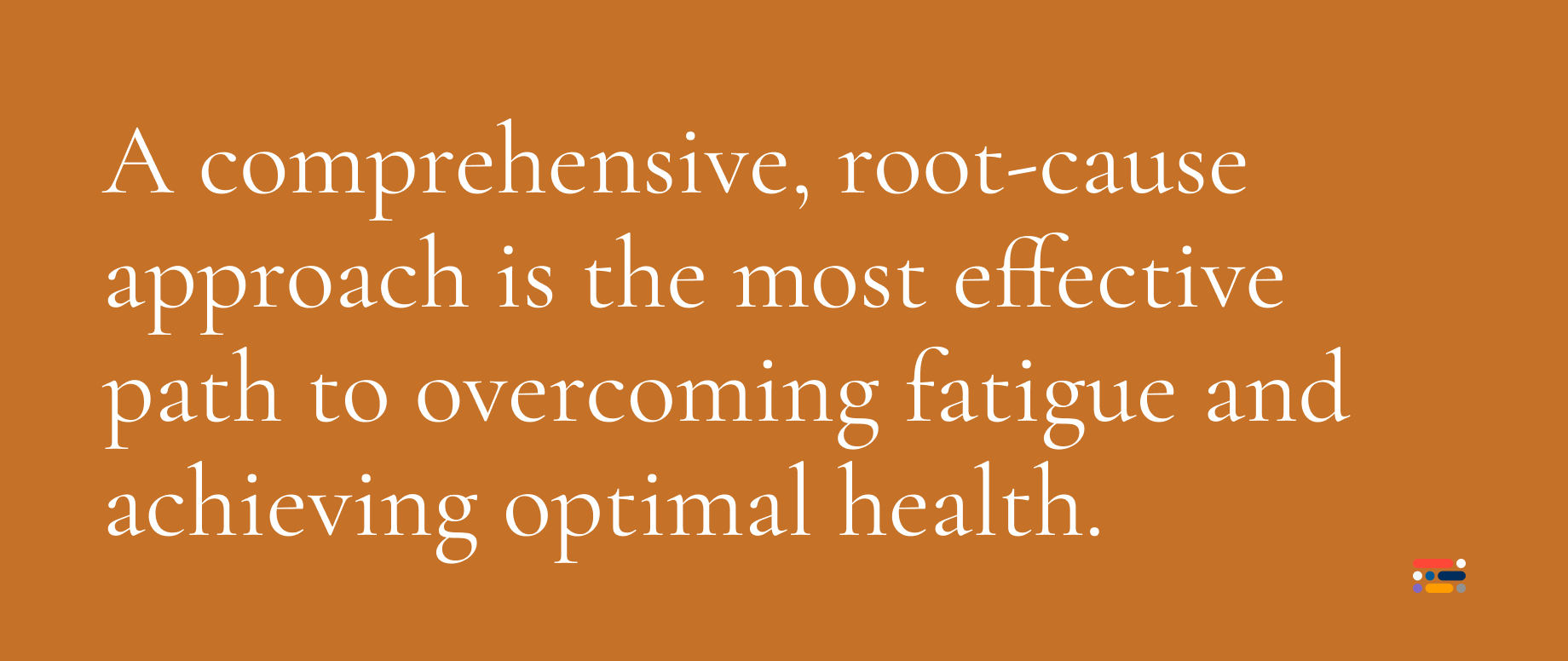We use cookies to enhance your browsing experience and analyze the performance of our website. By clicking Continue, you agree to the use of cookies. For more information, please see our Privacy Policy or update your Cookie Preferences.


Globally, 20.4% of adults and 11.7% of minors suffer from fatigue.1 Fatigue is a challenging symptom for healthcare providers to diagnose due to its many possible causes. There is no single test for fatigue; instead, there are many tests for the many conditions that can cause it. On top of that, fatigue is often multifactorial - meaning multiple factors contribute to it. Given the complexity of diagnosing fatigue, is it even possible to solve it? A comprehensive, root-cause approach is the most effective path to overcoming fatigue and achieving optimal health.
The National Cancer Institute offers a great definition of fatigue as:
"An extreme sense of tiredness and lack of energy that can interfere with a person's usual daily activities. A person with fatigue may feel weak, worn out, heavy, slow, or run down. They may also have trouble speaking or concentrating, short-term memory loss, and mood or emotional changes."
This definition is important because it includes both physical and mental symptoms that people with fatigue can experience (and of course, its not only cancer patients who experience fatigue).
Many people with chronic diseases experience fatigue because of their condition. Autoimmune diseases, diabetes, infections, allergies, and other conditions involve various underlying processes that have downstream consequences resulting in fatigue. People with chronic diseases may be taking medications that also cause fatigue.2
A top priority should be to consider obvious lifestyle root causes for fatigue. Because typical doctor's office visits are limited, there may not be enough time to discuss sleep quality, diet and nutrition, stress levels, exercise, and alcohol, caffeine, or tobacco use. These factors play a crucial role in tiredness and fatigue and can be overlooked.3 Taking an inventory of how well you are doing in each of these areas, and working towards improvement, can have tremendous effects on your overall energy levels.

If you are experiencing fatigue, your doctor will typically order standard bloodwork to look for things like anemia and thyroid issues which are easily treated. However, basic lab results lead to treatment in only 5% of patients.2 Many times, after testing, people will hear that all their tests are normal and there is nothing wrong. This unsatisfying answer often prompts people to search elsewhere, because clearly, something IS wrong.
Basic bloodwork does include a few nutritional markers. For example, a common test called a Comprehensive Metabolic Panel measures calcium, potassium, and total protein. Despite the word comprehensive, these are not the only nutrients our body needs as fuel. A healthcare provider might add additional individual nutritional tests like vitamin D, B12, and folate levels. Again, these are only a few of many nutrients our body needs to function optimally.
Conventional healthcare practitioners generally don't test beyond basic labwork. This approach is severely limiting because there are still many unexplored areas and potential answers waiting to be uncovered. With truly comprehensive testing, no stone is left unturned in the search for root causes of fatigue.
Genova's comprehensive nutritional test, the Metabolomix+, can reveal underlying nutritional needs that are important for energy production. Results include personalized recommendations for amino acids, fatty acids, vitamins, minerals, digestive support, and other nutrients. This type of assessment is easy to perform at home and goes far beyond basic labs to help you identify the root cause of your fatigue.
Remember learning about the Krebs cycle in high school biology class? It's the process that helps the mitochondria, the powerhouse of the cell, generate energy.5 If you don't remember, that's ok! The key point is that the citric acid cycle (Krebs cycle) requires nutrients like B-vitamins and minerals to work. The Metabolomix+ test checks to see if you have enough of these nutrients to keep your mitochondria fueled. Hint: When your cells aren't making energy, you can feel fatigued!
This type of testing is unique. It measures byproducts called organic acids from your body's metabolism, along with amino acids, fatty acids, and other key metabolites. These measurements provide a comprehensive view of how well your cells are functioning in their everyday activities.4
Metabolomix+ identifies imbalances and deficiencies in several critical areas:
By analyzing these comprehensive data points, the Metabolomix+ provides a holistic assessment to help uncover the root causes of your fatigue, guiding effective interventions to reclaim your energy and improve overall health.
Did you know that our body produces over 50 hormones and imbalances in many of them are linked to fatigue? Imbalances in our reproductive hormones, estrogen, progesterone, and testosterone, can be related to fatigue.8910 Disrupted melatonin, the sleep hormone, can lead to poor sleep quality resulting in fatigue.1112 Cortisol, our body's stress hormone, also plays a role in fatigue.1314
Genova's comprehensive Hormonal Health Test measures all these hormones, but the Sleep Hormone Test and Stress Hormone Test can also be evaluated individually.
Other types of testing that functional medicine practitioners order to better understand fatigue include toxin testing, hidden infection testing, and gut health testing to assess nutrient malabsorption. The Metabolomix+ nutritional test includes toxic heavy metal testing and a few measurements for detoxification function.
The conventional medicine approach to fatigue is not bad - it's quite necessary. However, it's incomplete, leaving many people feeling frustrated and looking for answers on their own. A comprehensive, tailored approach for every person is the ideal way to solve health problems. If you're curious about finding a practitioner that provides a more comprehensive approach to your health, check out Navigating Healthcare Models: Which Path is Right for You?.
This article is meant for educational purposes only and is not meant to be misconstrued as medical diagnosis or treatment advice.